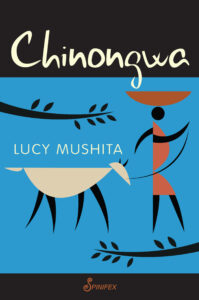Zimbabwean author Lucy Mushita has written a moving, original and emotional novel called, Chinongwa. The book recounts a coming-of-age story set in rural 1920s Zimbabwe. Chinongwa’s family have been displaced from their lands and are very poor. One desperate solution to hunger is to trade young daughters into marriage. Chinongwa, a small, thin girl, is eventually offered as a second wife to a man who is old enough to be her grandfather.
Given Lucy Mushita’s brave decision to tackle child marriage, BroadAgenda editor Ginger Gorman had a chat with the debut author.
This book was based on a real story from your community. Why was it so hard to find out the background to this story from people in your village?
Though not my own grandmother (both my grandmothers died giving birth), Chinongwa’s story was a village shame that was whispered about.
What happened when you tried?
Between the age of three and five, I innocently joined a conversation of these two grandmothers. One of them threatened to wash my mouth with soap if I repeated what I had heard. I ran away but from then on, Grandmother Chinongwa’s story became my obsession. I’d pretend to play next to adults, eavesdropping. Years later, I’d return from France with my first child, to discover that I could now join adult conversations. On asking questions about Chinongwa, I got three reactions.
‘Who send you to ask me?’
‘I don’t remember; let sleeping dogs lie.’
‘That was sad, wasn’t it?’
I had to pull any information out of their noses.
Is it usual to be so secretive about these things in Zimbabwe?
Unpalatable pasts tended to be cloaked in tired nods, shrugs and sighs. They had given her away; they were responsible for all her suffering. The sight of Chinongwa could only provoke their guilt, making it difficult for them to maintain the group amnesia they preferred.
Please give us the global context for child marriage and why it makes you so angry.
In Zimbabwe, the man pays roora (a dowry) in money, cows, goats, clothes – for his bride. This incentivises parents to dehumanise their daughters and treat them as objects of exchange. While an unknown adult man who has sex with a random girl commits paedophilia, when that random girl’s parents (who should protect her) permit the same random man to have sex with her, the girl becomes a bride.
Shakespeare says, “A rose by any other name would smell as sweet.”
Sex with a child, regardless of roora, is still paedophilia. A 2023 UNICEF report reveals that of all marriages, 19% are of children, 45% in South Asia, 20% in Sub-Saharan Africa.
What drives child marriage within Zimbabwe?
Tradition (millennial customs that haven’t changed), poverty (receiving roora is more attractive than paying school fees), parental greed (an old man loaded with bling is easily welcome).
Your character is only a little girl (the same age as my own daughters!). How have you tried to portray Chinongwa so we see her humanity?
Though Chinongwa knows she will most likely be given away, she is a child, innocent to what marriage entails. She needs her mother, chases butterflies, dreams of going to school.
Your writing is highly beautiful and evocative. Tell us how you developed this style.
My writing was most likely influenced by the poetic and imaged language the elders used when I was small. Most of these illiterate raconteurs mesmerised us children as they sang, slammed and danced to poetry. As my writing is very visual, and I was telling their story, I was a simple interpreter.
‘She had never seen talking lions or giraffes, never seen singing pythons that gave their eggs to humans but then, neither had she ever seen overflowing granaries, rivers of milk and honey, nor the kneeless with a woman-king.’
‘A man who never marries. When he dies, a mouse is tied onto his back and he is told that it is his child. That way, he does not come back to haunt his family looking for his children. Because he cannot see what is on his back, he thinks it is a child.’

The cover of ‘Chinongwa.’ Picture: Supplied
Why is this a feminist call to arms? What are you hoping people will take from your book? What change do you hope for?
The measure of a society is how it treats its most vulnerable. My hope is that once one has read Chinongwa, the above-mentioned statistics will acquire a face, a name, a place. I want readers to put themselves in Chinongwa’s shoes, feel her likes, hear her laughter, sense her fear, pain and helplessness at leaving her mother and home. I want them to put on their shining armour, come to her rescue.
I want communities to stop dressing girls in bridal outfits to celebrate weddings in which the child cannot fathom the horror awaiting her.
I want men and women to wake up to the plight of girls, to lobby the UN to criminalise paedophilia. Otherwise, what kind of society are we to condone child rape. Slavery was outlawed.
What are we waiting for, to outlaw societal paedophilia? Given the choice, would any of us choose an eleven-year-old illiterate mother? I am sure we would all go for an older mother, who chose to have us, who knows what she is doing, who can protect us and satisfy our basic needs.
Picture at top: Author Lucy Mushita. Picture: Supplied
Ginger Gorman is a fearless and multi award-winning social justice journalist and feminist. Ginger’s bestselling book, Troll Hunting,came out in 2019. Since then, she’s been in demand both nationally and globally as an expert on cyberhate and the real-life harm predator trolling can do. She's also the editor of BroadAgenda and gender editor at HerCanberra. Ginger hosts the popular "Seriously Social" podcast for the Academy of the Social Sciences in Australia. Follow her on Twitter.





